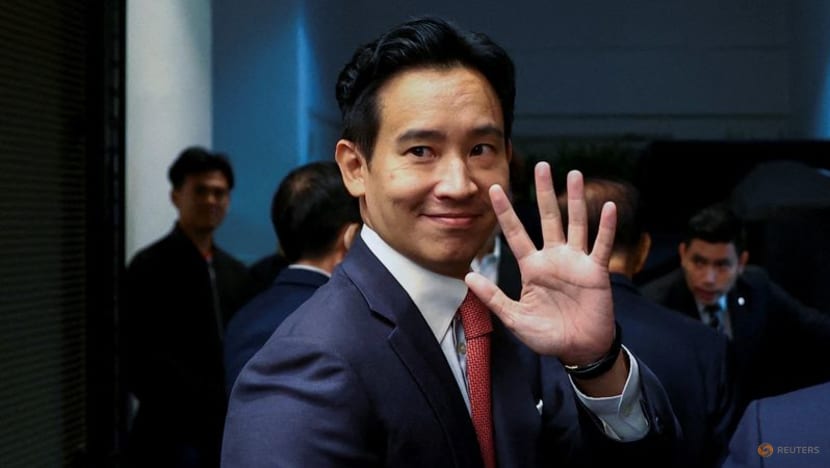Military-appointed Senate poses potential hindrance for Thai PM candidate Pita Limjaroenrat

BANGKOK: Thai prime ministerial candidate Pita Limjaroenrat may have sufficient support from political allies to form a government after an electoral victory on Sunday (May 14).
But when it comes to his race for the premiership, there remains one obstacle that could hold him back from the finish line: The 250 senators in the Upper House, whose votes could determine Thailand’s next prime minister.
Forty-two-year-old Pita – the leader of the progressive Move Forward Party – and his eight-party coalition have secured 313 seats in the 500-member House of Representatives.
For Mr Pita to win the premiership, he needs the approval from more than half of the 750-seat National Assembly, or at least 376 votes in either the House of Representatives alone or the Senate too.
This is where complications arise.
The coalition needs 63 more votes for its prime ministerial candidate Mr Pita to become prime minister, but several senators seem undecided on whether they will support his premiership, while others have made it clear they will vote against him.
One of them is Mr Jadej Insawang. He told local media on Tuesday he will vote against Mr Pita because he disagrees with his stand on the royal defamation law.
“I view that this approach is intended to belittle the monarchy,” he said.
Political observers view the issue as a political fault line in present-day Thailand, where calls for reform of the monarchy have been heard since pro-democracy demonstrations led by youths three years ago.
Mr Pita and his party support the amendment of the royal defamation law to prevent it from being used as a political tool.
Also known as the lese-majeste law, it punishes whoever defames, insults or threatens the king, the queen, the heir-apparent or the regent with imprisonment of three to fifteen years – the same penalty as for involuntary manslaughter.
Since 2020, hundreds of political activists including children have been prosecuted with the law.
MOUNTING PRESSURE ON THE SENATORS
Following the general election on Sunday, the 250 senators and their role in selecting the prime minister has become a matter of interest.
This is largely because they were not elected but handpicked and appointed by the National Council for Peace and Order (NCPO) – the military government led by Gen Prayut Chan-o-cha.
Gen Prayut is Thailand’s incumbent prime minister. He seized power from the democratically elected government of Yingluck Shinawatra in 2014 and put Thailand under authoritarian rule for nearly five years.
After the previous election in 2019, all but one senator voted for his premiership. But the scenario is different this time with Mr Pita, whose party has been critical of the senators’ role in the prime ministerial selection.
Following its unexpected win last weekend, some senators implied that Mr Pita’s party should try to consolidate 376 votes in the Lower House instead of having to rely on them.
“You came in first place. So, go coordinate with every political party. If you get 376 Members of Parliament (MPs), then it’s okay and you don’t need the senators,” Mr Wanchai Sornsiri told local media on Monday.
Two days later, he wrote on Facebook that he will vote for “whoever can consolidate the majority of votes among the MPs”.
The reactions of certain senators have provoked strong criticisms from the public, whose consensus was clearly reflected in the general election.
Preliminary results published by the Election Commission on Monday showed most Thais favour opposition parties Move Forward and Pheu Thai over the pro-military government of Gen Prayut.
With the people’s consensus, Mr Pita is confident his coalition can form a government with him as the prime minister.
“Going against the people’s consensus is not beneficial to any side at all, even to the Senate,” said the prime minister hopeful in a press conference on Monday.
The 250 senators are under mounting pressure from Thais. While some remain unclear about their votes, others have come out to show support for the Move Forward Party leader. This includes Mr Sathit Limpongpan, who told local media he initially planned to abstain but later changed his mind.
“When you have garnered 313 votes and don’t intend to garner more, this shows the senators' participation has already been included in the picture. I, as a senator, have to exercise my rights according to democratic principles by voting in the same direction as the majority of MPs,” local news outlet The Standard quoted Mr Sathit as saying on Thursday.
Meanwhile, it is clear that Mr Pita will not receive the approval of at least 70 potential MPs from the Bhumjaithai Party.
The political group issued a statement on Wednesday, maintaining it will not support a prime minister candidate whose party’s policies include the amendment or abolishment of the royal defamation law.


















